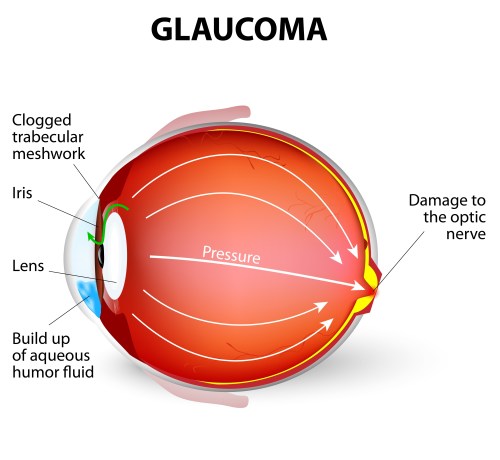Glaucoma; Answers to Common Questions
- posted: Jun. 06, 2018
This was originally posted to our Tumblr on January 05, 2018. Click here to view the original.

Glaucoma is a group of eye disorders that lead to progressive damage to the optic nerve. People with glaucoma can lose nerve tissue, resulting in permanent vision loss. The optic nerve is a bundle of about 1 million individual nerve fibers that transmits the visual signals from the eye to the brain. In the most common form of glaucoma, primary open-angle glaucoma, the fluid pressure inside the eye increases. This increase in pressure may cause progressive damage to the optic nerve and loss of nerve fibers. Vision loss may result. Advanced glaucoma may even cause blindness. Also, about ⅓ of all glaucoma cases have normal ocular pressure and for uncertain reasons the optic nerve degenerates.
Glaucoma is the second-leading cause of blindness in the U.S. It most often occurs in people over age 40, although an infant (congenital) form of glaucoma exists.
The following factors can increase the risk for developing glaucoma:
- Age. People over age 60 are at increased risk for the disease.
- Race. African Americans are significantly more likely to get glaucoma than Caucasians, and they are much more likely to suffer permanent vision loss.
- Family history of glaucoma. Having a family history of glaucoma increases the risk of developing glaucoma.
- Medical conditions. Some studies indicate that diabetes, high blood pressure and heart disease may increase the risk of developing glaucoma.
- Physical injuries to the eye. Severe trauma, such as being hit in the eye, can result in increased eye pressure that can lead to glaucoma.
- Other eye-related risk factors. Conditions such as retinal detachment, eye tumors and eye inflammations may also trigger glaucoma. Some studies suggest that high amounts of nearsightedness may also be a risk factor for glaucoma.
- Corticosteroid use. Using corticosteroids (including cortisone, hydrocortisone and prednisone) for prolonged periods of time appears to put some people at risk of getting secondary glaucoma.
The most common form of glaucoma, primary open-angle glaucoma, develops slowly and usually without any symptoms. Many people are not aware they have the condition until they have significant vision loss. Initially, glaucoma affects peripheral or side vision, but it can advance to central vision loss. If left untreated, glaucoma can lead to significant vision loss in both eyes, and may even lead to blindness.
Glaucoma cannot currently be prevented nor is there a cure. But if it is diagnosed and treated early, it can usually be controlled. Medication (mostly in the form of eye drops) or surgery can slow or prevent further vision loss. However, vision already lost to glaucoma cannot be restored. That is why the American Optometric Association recommends an annual eye examination. Depending on your specific condition, your doctor may recommend more frequent examinations.
Written By:
Scott Baylard, OD
Complete Family Eyecare & Optique
Complete Family Eyecare & Optique
2350 Atlanta Hwy Unit 110,
Cumming, GA 30040
Hours of Operation
Monday
8:00 am - 6:00 pm
Tuesday
8:00 am - 7:00 pm
Wednesday
8:00 am - 6:00 pm
Thursday
8:00 am - 7:00 pm
Friday
8:00 am - 5:00 pm
Saturday
8:00 am - 1:00 pm
Sunday
Closed